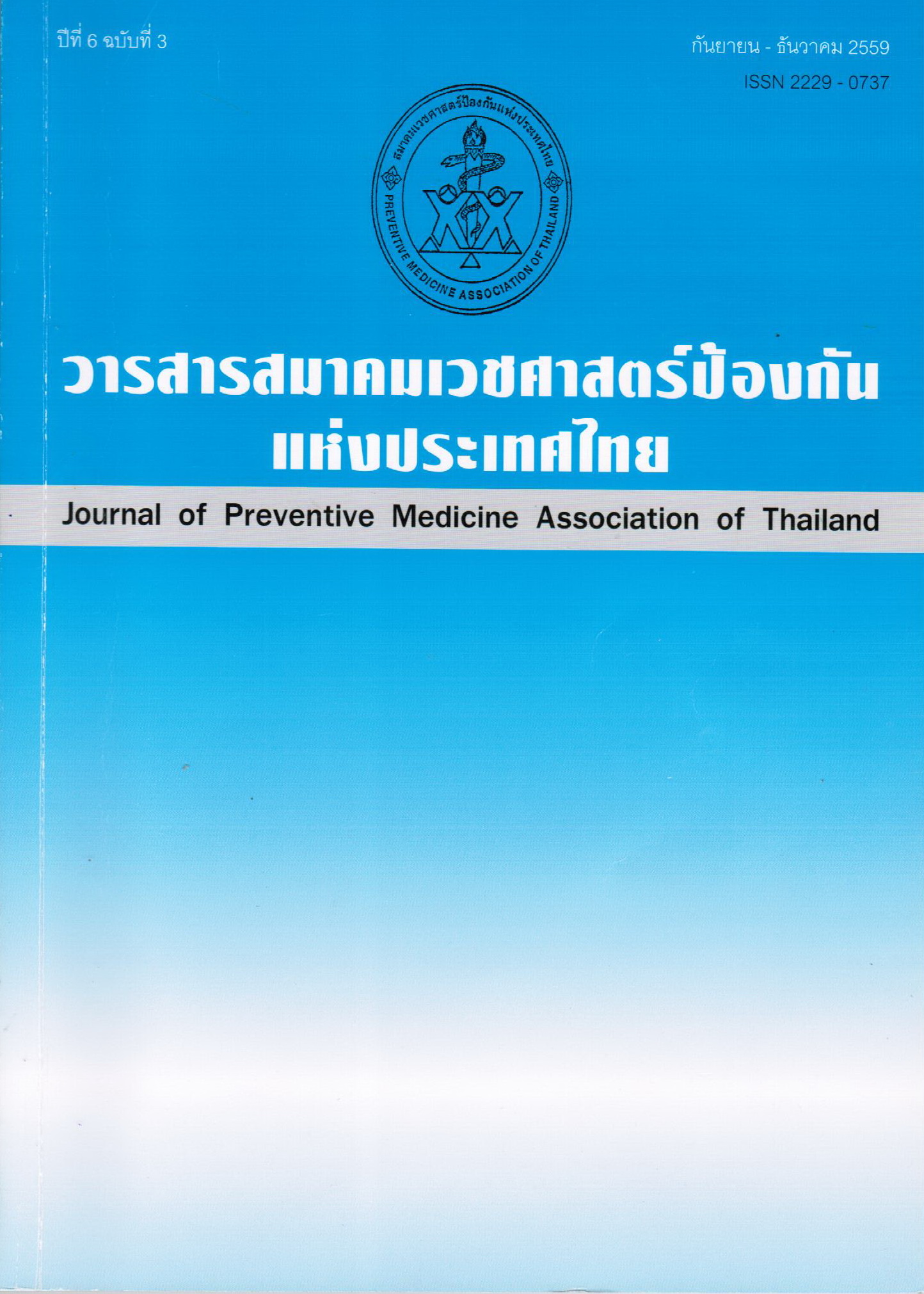Self-care Behaviors of the Elderly in Tha-Ruea District Phra Nakhon Si Ayutthaya Province
Keywords:
Self-care behaviors, ElderlyAbstract
Changes in Thailand’s population structure show that Thai society now faces the aging society and the elderly are likely to have increased in number. Thus, Self-care behaviors of the elderly become a must for their health. The objectives of this research were : (1) to study self-care behaviors of the elderly in Tha-Ruea district, Phra Nakhon Si Ayutthaya province, (2) to study the relationship between demographic variables and self-care behaviors of the elderly, (3) to study the relationship between related variables including preparation for becoming the elderly, societal encouragement from family members, self-esteem and self-care behaviors of the elderly, (4) to study the predictive variables of self-care behaviors of the elderly. The sample was 367 elderly people, aged over 60, living in Tha-Ruea district, Phra Nakhon Si Ayutthaya province. The research instrument was the questionnaire developed by the researcher and test for content validity and reliability of the instrument was accepted. Data were analyzed with statistics comprised of percent, mean, standard deviation, one way ANOVA: t-test, F-test, Pearson’s correlation coefficient and Multiple Linear Regression Analysis.
The results showed that self-care behaviors of the elderly in Tha-Ruea district, Phra Nakhon Si Ayutthaya province were generally at a good level. The older people who had different educational levels and different occupations behaved differently in self-care at 0.05 level of significance. The related variables including preparation for becoming the elderly, societal encouragement from family members, self-esteem were related to self-care behaviors of the elderly at 0.01 level of significance.The predictive variables of self-care behaviors of the elderly were self-esteem, societal encouragement from family members, and preparation for becoming the elderly. Moreover, all variables were able to predict self-care behaviors of the elderly for 40.4 percent.
References
2. กรมอนามัย กลุ่มอนามัยผู้สูงอายุ. รายงานผลการสำรวจสุขภาวะผู้สูงอายุไทย ปี 2556 ภายใต้แผนงานส่งเสริมสุขภาพผู้สูงอายุและผู้พิการ. นนทบุรี: โรงพิมพ์วัชรินทร์ พีพี ; 2556.
3. สมจิต หนุเจริญกุล. การดูแลตนเอง : ศาสตร์และศิลปะทางการพยาบาล. กรุงเทพฯ: วี เจ พริ้นติ้ง ; 2540.
4. รจนารถ ร่วงลือ. การปฏิบัติกิจกรรมการดูแลตนเองของผู้สูงอายุในเขตเทศบาลเมือง ราชบุรี. (วิทยานิพนธ์ปริญญามหาบัณฑิต). สาขาการพยาบาลชุมชน, บัณฑิตวิทยาลัย. ขอนแก่น: มหาวิทยาลัยขอนแก่น ; 2536.
5. สำนักงานสาธารณสุขจังหวัดพระนครศรีอยุธยา. รายงานการเตรียมความพร้อมสู่สังคมผู้สูงอายุ (จังหวัดพระนครศรีอยุธยา). พระนครศรีอยุธยา: สำนักงานสาธารณสุขจังหวัดพระนครศรีอยุธยา ; (เอกสารอัดสำเนา). มกราคม 2559.
6. สำนักงานสาธารณสุขอำเภอท่าเรือ. รายงานการพัฒนาสุขภาพตามกลุ่มวัย “กลุ่มวัยผู้สูงอายุ”.พระนครศรีอยุธยา : สำนักงานสาธารณสุขอำาเภอท่าเรือ ; (เอกสารอัดสำาเนา). พฤษภาคม 2559.
7. พวงรัตน์ ทวีรัตน์. วิธีการวิจัยทางพฤติกรรมศาสตร์และสังคมศาสตร์. กรุงเทพมหานคร: สำนักทดสอบทางการศึกษาและจิตวิทยา มหาวิทยาลัยศรีนครินทรวิโรฒ ; 2543.
8. เตือนใจ ทองคำ. พฤติกรรมการดูแลตนเองของผู้สูงอายุในอำเภอตากฟ้า จังหวัดนครสวรรค์. (วิทยานิพนธ์ปริญญามหาบัณฑิต). สาขาจิตวิทยาชุมชน, บัณฑิตวิทยาลัย. นครปฐม: มหาวิทยาลัยศิลปากร ; 2549.
9. ศิราภรณ์ นำสุข. พฤติกรรมการดูแลตนเองของผู้สูงอายุกับสถานะสุขภาพของผู้สูงอายุ : กรณีศึกษาตำบลคลองทราย อำเภอนาทวี จังหวัดสงขลา. (วิทยานิพนธ์ปริญญามหาบัณฑิต). บัณฑิตวิทยาลัย. สงขลา: มหาวิทยาลัยราชภัฏสงขลา ; 2556.
10. อาทิตยา ทะวงศ์. ปัจจัยที่มีความสัมพันธ์กับพฤติกรรมการดูแลตนเองของผู้สูงอายุ: กรณีศึกษาตำาบลข่วงเปา อำาเภอจอมทอง จังหวัดเชียงใหม่. (วิทยานิพนธ์ปริญญาศิลปศาสตร์มหาบัณฑิต). การบริหารการพัฒนาสังคม คณะพัฒนาสังคมและสิ่งแวดล้อม. บัณฑิตวิทยาลัย. กรุงเทพมหานคร: สถาบันบัณฑิตพัฒนาบริหารศาสตร์ ; 2553.
Downloads
Published
How to Cite
Issue
Section
License
บทความที่ลงพิมพ์ในวารสารเวชศาสตร์ป้องกันแห่งประเทศไทย ถือเป็นผลงานวิชาการ งานวิจัย วิเคราะห์ วิจารณ์ เป็นความเห็นส่วนตัวของผู้นิพนธ์ กองบรรณาธิการไม่จำเป็นต้องเห็นด้วยเสมอไปและผู้นิพนธ์จะต้องรับผิดชอบต่อบทความของตนเอง






